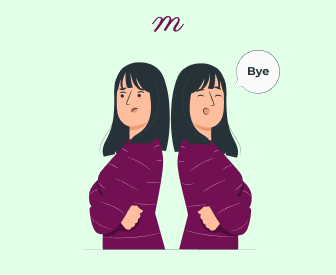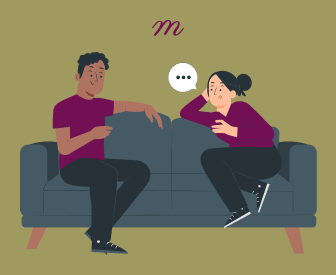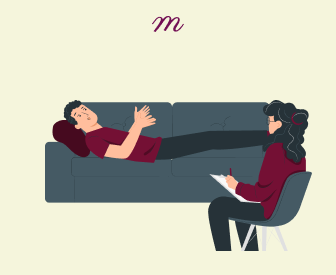Have your progress notes written for you automatically
Therapy is a space where an individual gets to express their real self. One they aspire to be or wish they could show to the world. It is a space where they can say their thoughts that are constantly running in their mind out loud. In this case, trust and open communication are essential elements to build a strong therapeutic relationship.
This explains why confidentiality and non-judgmental attitude form the core values of the therapy process. It takes an ample of time to be invested by both the therapist and the client.
The Challenge of Client Withdrawal
Navigating a client throughout their therapeutic journeys comes with its own learnings, doubts, issues, challenges, etc. Whether you are just a fresh graduate with a masters in psychology or you have been in the counselling field for 2…3…or even 10 years, you are always going to question whether you are doing it right or not. Self-doubt is always lurking in the corner. Predominant challenges faced by both the client & the therapist include resistance, financial troubles, inconsistent journey, ethical dilemmas, trust issues, managing emotional stress and the list will never end.
Based on personal experience along with inputs from fellow therapists, I feel clients who withdraw from therapy are the most challenging to deal with respect to a lot of aspects. Some clients might let you know what went wrong or some might not even respond to you at all. There is this huge aspect of uncertainty of actually finding out the exact reason in case of withdrawals. It is getting even more difficult as online mode of therapy is being preferred over offline sessions by people where the possibilities of no-shows are more frequent as well.
This is not the worst case scenario a therapist has to deal with actually. But if it worsens the little bit of imposter syndrome a therapist already has, then it is. Client withdrawal happens more than a therapist can actually consider. This can be attributed to a lot of factors including but not limited to the stigma surrounding how therapy works, the financial aspect of it, the main question of whether therapy will work, if it is actually helpful, followed by a million sets of questions.
Managing Client Withdrawal
1. Understand the situation
First of all, therapists should try to understand the situation which made the client to withdraw from the session. It might be due to multiple reasons such as the rapport between the client & you might not be good, the client might feel dissatisfied with the therapy process or they might feel less connected with the therapist. Or before internalizing the reason as it is because of you as a therapist, we can explore the other external options like lack of personal space, financial difficulty and literally anything else. Mutual support & trust is very much indispensable in this case.
2. Open Communication
Secondly, believe it or not, open communication is the key to everything. If the client is being unresponsive or ghosting you even, try to reach out via preferred mode and enquire about their well-being. This small step will make them feel that they are valued and you are just keeping a check on them. Being empathetic & non-judgmental are our core values as a therapist. This is the key with which we should approach them and understand the reason behind it. If the client believes they are in an authentic safe space, they’ll automatically open up about what went wrong.
3. Collaborate with the Client
Another way could be when you as a therapist and client can explore the reason behind withdrawal together. Invite them to share their current views, doubts, issues, experiences or anything. If they feel very hesitant, help/allow them to process it and talk about it in their own pace. Ensure that as a therapist your language is inviting and curious, open ended questions asked with compassion can go a long way. This will allow them to take their own time & introspect over the issue. Being respectful & mindful of their decision is very crucial here. This might even lead them to actually build trust which might have been difficult for them to work on.
4. Explore Alternatives
Finding out other alternative options could also work here. The end goal of therapy is always to help the client feel and function better in their life. If therapy in itself is a hindrance to that, we may start looking for other alternatives that would be of support to the client. Helping them connect with the right resources for the time being might provide them relief. If the actual therapy process is the limitation here, then exploration of other modes of therapy like art therapy, play therapy, animal-assisted therapy and so on could also work.
5. Discuss
Opening the platform up for discussion with open-ended questions and providing them a safe space to discuss about the withdrawal could also be helpful. This enables them to introspect their own decision and they might even come up with an approach to work on the journey altogether. Taking enough time to figure out where it went wrong helps us to slow down and focus on the issue at hand.
6. Reflect & Take Supervision
Most importantly rather than taking the withdrawal personally to yourself as a therapist, reflect on your own feelings and maybe seek the help of your supervisor/colleague to find out what would be best for the client. This will help you to look at the issue in hand from a different perspective. This also helps us to look at the problem from multiple viewpoints & explore the reasons behind it.
7. Consider Termination
When nothing works out, maybe we consider terminating the therapeutic relationship altogether. If it not working out due to any reason, it is not working out. Acceptance is vital here. This should be from both the parties. We can provide referral sources or connect the client with a therapist whom they think it might work. The end goal is to find the right fit for the client so that they get the actual help required.
8. Client Autonomy
Finally respecting the client’s decision no matter what it is. This gives the autonomy that everyone craves in their lives at any point of time. As an option, you can also let the client know if they are willing to continue, they are more than welcome to approach you again. This makes them feel appreciated and may even enable them to re-engage in therapy whenever they are ready.
To summarize, the key aspects in navigating the withdrawal of a client are mutual trust, open communication, a platform/safe space to explore, being respectful and non-judgmental of their decision no matter what they ultimately decide to go ahead with. All everyone needs is to feel better whether they are a client or therapist. This should be done in their own space and time.
Case Study
Let us understand this with an example. 32 years old, Nimisha has been having concerns regarding her workspace – burnout, toxic employees and work culture. She has started therapy to help her with these things. After two sessions, Nimisha suddenly stops responding to communication and starts missing her scheduled therapy appointments. As her therapist, this situation presents a critical moment in the therapeutic relationship that requires curious navigation before drawing any assumptions.
In Nimisha’s case, the therapist sent a compassionate follow-up email expressing her concern and openness to communicate with the client.
“Hi Nimisha, I can see that we haven’t connected for our scheduled therapy sessions. I wanted to check in and ensure you’re doing okay. I am wondering if you’d be open to having a conversation about this. If something has changed in your circumstances or if you’re experiencing any hesitations about our sessions together, I’m here to listen without any judgments. Feel free to reach out if and when you feel comfortable. Take care.”
This email tries to ensure that the therapist is maintaining an open channel for communication, there is display of empathy and a safe space for the client to reach out to. The therapist refrains from making assumptions or expressing frustration, instead focusing on the client’s potential needs and emotional state.
If Nimisha continues to be unresponsive, the therapist can go about the situation in the following manner:
- Reflect on the earlier sessions to discover any moments of discomfort.
- Consult with a supervisor to gain an additional perspective on the circumstances.
- Respect the client’s autonomy by not pursuing further contact if no response is received on the email sent to the client.
This example shows that the client withdrawal is not necessarily about the failure of a therapeutic process, but an opportunity for deeper understanding, introspection, supervision and potential growth for both the therapist and the client. By maintaining professionalism, empathy, and respect, therapists can navigate these challenging situations with curiosity and compassion rather than assumption.
Therapy is a collaborative journey – sometimes, that journey might involve temporary pauses, detours, or even complete redirections. What matters most is maintaining the core therapeutic values of trust, respect, and genuine unconditional positive regard for the client’s well-being.
Disclaimer
All examples of mental health documentation are fictional and for informational purposes only.










